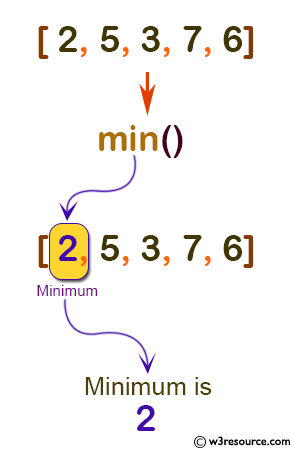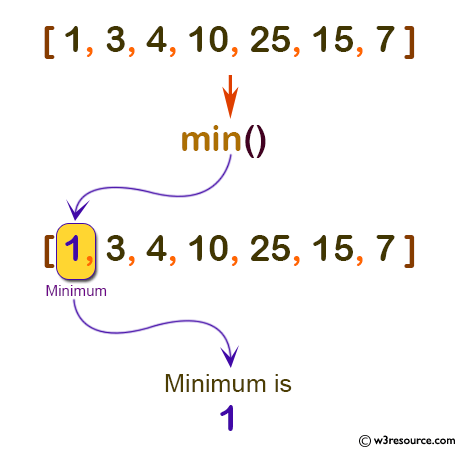Python: min() function
min() function
The min() function is used to find the item with the smallest value in an iterable.
Version:
(Python 3.2.5)
Syntax:
min(iterable, *[, key, default])
Parameter:
| Name | Description | Required / Optional |
|---|---|---|
| iterable | An iterable, with one or more items to compare. | Required |
| key | Specifies a one-argument ordering function like that used for list.sort(). | Optional |
| default | Specifies an object to return if the provided iterable is empty. If the iterable is empty and default is not provided, a ValueError is raised. | Optional |
Syntax:
min(arg1, arg2, *args[, key])
Parameter:
| Name | Description | Required / Optional |
|---|---|---|
| arg1, arg2, ..args | If one positional argument is provided, iterable must be a non-empty iterable. The largest item in the iterable is returned. If two or more positional arguments are provided, the largest of the positional arguments is returned. | Required |
| key | Specifies a one-argument ordering function like that used for list.sort(). | Optional |
Return value:
The smallest item in an iterable.
Example: Python min() function
# using min(arg1, arg2, *args)
print('Minimum is:', min(2, 5, 3, 7, 6))
# using min(iterable)
num = [1, 3, 4, 10, 25, 15, 7]
print('Minimum is:', min(num))
Output:
Minimum is: 2 Minimum is: 1
Pictorial Presentation:

Pictorial Presentation:

Example: Python min() function
x = [25, 100, 1500, 725]
y = [10, 5]
z = [35, 525, 98]
# using min(iterable, *iterables, key)
print('Minimum is:', min(x, y, z, key=len))
Output:
Minimum is: [10, 5]
Python Code Editor:
Previous: memoryview()
Next: next()
Test your Python skills with w3resource's quiz
